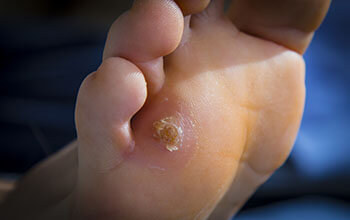Corns and Calluses Treatment in Wayne, Paramus, Clifton, Montclair, Randolph and Edison, NJ

Corns are thickened areas on the skin’s surface, and they can be irritating and painful. Corns are commonly found on the feet, and they are typically circular or cone-shaped. They develop where there are areas of pressure or friction, such as on the little toe when it rubs up against shoes, or on the ball of your foot.
While corns are often confused with calluses, there is a difference between them. Corns are raised bumps that consist of rough, thickened areas of skin that may be dry or waxy. They also tend to be surrounded by skin that is inflamed and are usually much smaller than calluses.
The best treatment for a corn varies from person to person and is best determined by a podiatrist. Certain topical over-the-counter products may be suggested, or a more serious treatment may be prescribed. Diabetics should consult with a podiatrist immediately if they have developed a corn, as small wounds such as corns can potentially develop into more serious conditions.
Orthotic inserts, which are fitted by a podiatrist, may also help with treating corns. Inserts fit right into the shoes and adjust the way the feet fit into the shoes, thus fixing the way one walks. Proper-fitting orthotics can help reduce friction, which can in turn help reduce corn formation and exacerbation.
Surgery is rarely used to treat corns, but does occur on occasion. Corn surgery deals with the underlying issue that causes corns to develop. During surgery, the bone is shaved and any abnormalities are corrected, thus reducing the amount of friction that occurs during walking.
To prevent corns, the first step is reducing friction. Always wear shoes that fit well and don’t rub the feet. Wearing cushioned insoles in your shoes can also reduce friction. While there are many ways to prevent corns, it is best to consult a podiatrist with any questions you may have.
